TIMBER BAY WINDOWS IN LONDON AND SURREY
RESTORE YOUR TIMBER BAY WINDOWS TO THE STANDARD OF THE ORIGINAL CRAFTSMEN
By adding upgraded components and specialist glazing, your new bay window may be upgraded to further improve Draught-proofing, sound proofing, security, condensation, heat retention, and overheating in direct sunlight.
Timber bay windows are available in a range of shapes, designs and styles, and we’re happy to advise on which style would best suit your property. Our network of approved installers have fitted thousands of bay windows and our manufacturers can replicate any design, manufacturing it to the same (if not, better) standard as the original craftsmen.
Below, we’ve outlined the high specification that we insist upon from our approved manufacturers. You can also read about the upgrade options, should you wish to further extend the performance of your
new bay windows.

ANTI-WARP FRAME ENGINEERING
Typically, simple sawn timber – predominantly Nordic pine – was the go-to timber for timber sliding sash bay windows. Known for its stability and ability to hold paint, Nordic pine is a hardy slow-grown redwood. Despite being longer lasting, hardwoods are rarely used for sliding sash bay windows as they tend to twist and warp – much more than redwoods. They also bleed resins into the paint, which isn’t an issue if you plan on varnishing your timber bay windows, but can be troublesome for paintwork.
The pine windows that were fitted 50-80 years ago, for example, are only just been replaced now. Hardwoods can be used for flush or lipped casement bay windows, as expansion and contraction is allowed for with a gap between the frames and sash. Modern laminated and seasoned hardwoods are more dynamically stable than sawn hardwoods.
The most popular and cost-effective timber for frames is cross grain laminated redwood, while hardwood is standard for sills. Hardwood sills prevent that part of the window rotting, due to the sill sitting on the damp exposed stone or brickwork. Cross grain timber is created by sawing the timber into strips, and then bonding it back together with the grains facing opposite directions. When the strips try to twist in opposite directions, they simply counter each other and the frame doesn’t twist.
The lifespan of redwood bay windows – assuming they are painted regularly – is about 50 years, which can be extended with refurbishment. Be aware that south-facing windows generally need to be painted more regularly than north-facing windows. If you’d prefer a longer service life than 50 years, see the upgrade options below. Hardwoods can last longer but may require more frequent maintenance. The longest lasting timber is a specially treated softwood called Accoya. It is expensive, but worth it if you plan to pass your property down through the generations.


FACTORY-FINISHED
Teknos, a world-leading timber paint manufacturer (and our preferred), has conducted extensive research on the lifespan of timber windows.
This research has proven that where timber windows are sealed, painted and glazed in a factory (known as factory-finished), they will last up to 30% longer and require less maintenance than windows that are glazed or painted on site.
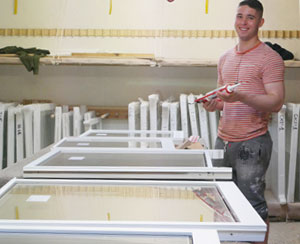
FIRST FIX OR FULLY-FINISHED INSTALLATION
Choose from either a first fix or fully-finished installation. First fix offers the flexibility of having your windows installed into the opening, ready for your own builder to seal them in and complete the finishing touches to the interior.
Opt for the fully-finished installation, however, and our approved installers will do it all for you, including making good the internal plasterwork, installing and painting the internal window boards and period architraves.

LONG (8-12 YEARS) PAINTING CYCLES
Extend your painting cycles by applying 3-6 coats (or three thicker coats) of Teknos timber microporous paint at the start. We’ve found that, compared to standard painting cycles of 2-4 years, this additional step can extend your painting cycles to 8–12 years. This technologically-advanced microporous paint allows the timber to breathe and prevents any flaking that you might see with oil-based paints. It essentially acts as a sun screen, preventing the sun’s harmful UV rays from damaging the timber underneath the paintwork. It’s worth noting that south-facing paintwork will require more frequent repainting than their north-facing counterparts.
There are a few ways you can protect the paintwork at home as well. Washing the polluted dust from the external faces with a sponge and water twice a year can have a big impact. And when it comes to repainting, ensure you use the same water-based microporous paint as a base coat, which can be applied without sanding or removing the sashes, as you’d ordinarily do with oil-based paints. Once repainted, your windows will look brand new again.
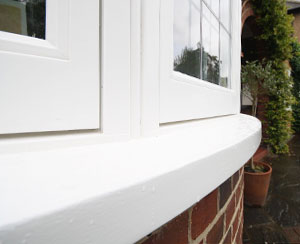
QUALITY IRONMONGERY
A full range of period and contemporary ironmongery is available for both sliding sash and casement bay windows.
We will guide you through your options as part of the quotation process.
For a general overview of the options, see the product pages for both sliding sash and casement windows.

HIGH-PERFORMANCE Draught-proofing
Dynamically stable engineered timber in single and double rebate options, combined with modern draughtproof seals will keep your bay windows draughtproof in the most severe of climates.

INTERNAL OR EXTERNAL GLAZING
For centuries, period timber bay windows were glazed from the outside, with the glazing held in place by putty or timber beads. If you live in a conservation area or would simply prefer external putty beads, both these options are still available today, however internal glazing beads are the norm for security and longevity reasons.
Security-wise, internal glazing beads mean that the glazing cannot be removed from the outside, and they last longer because both external timber and putty beads are exposed to the elements.

PERFORMANCE GLAZING
The best double glazing for heat retention is coated with an invisible metallic low-emissivity soft coat. This is up to 33% more efficient at preventing heat loss than the industry standard hard coat low-e alternatives.
We specify soft coat double-glazed units with warm edge spacer bars and gas-filled cavities for ultimate performance. If required, additional invisible glass coatings and glass types, such as laminated glass, can be added to further improve soundproofing, security and/or solar reflection.
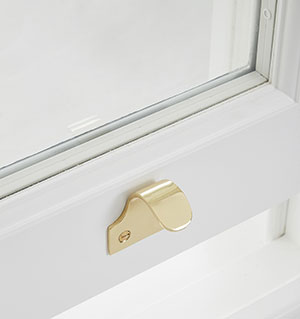
DECORATIVE GLAZING OPTIONS
As an alternative to clear glass, you can opt for decorative patterned glass for privacy or add lead strips on the glass in square, diamond or designer patterns. The glass that is held in between the lead patterns can also be stained and coloured. If you have existing stained glass windows, these may be refurbished and replaced with triple-glazed units, with the refurbished stained glass making up the centre pane.
Astragal or Georgian bars may be inserted into the double-glazed units of all period designs and shapes, either replicating what you already have or choosing a different look. These designs can also be simulated onto a photo of your home, so you can make a fully informed decision.
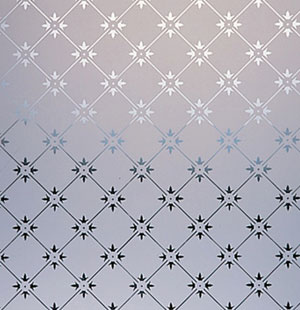
YOUR FREE QUOTATION INCLUDES
A ‘no-salesperson’, no-obligation emailed quote
A free home visit, if required (for those in London and Surrey)
CAD drawings with detailed specifications for each quoted product
Realistic before & after photo simulations, if required

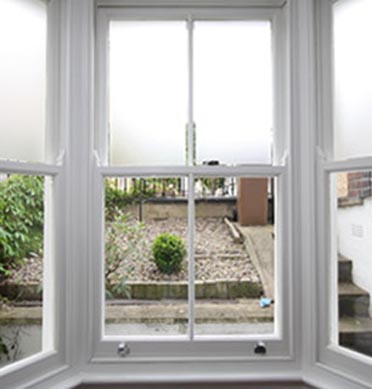


FOR LONDON AND SURREY
TIMBER WINDOW PRODUCTS
- SLIDING SASH WINDOWS
- CASEMENT WINDOWS
- BAY WINDOWS
- SPECIFICATIONS
TIMBER DOOR PRODUCTS
LOOKALIKES & ALTERNATIVES
- SITEMAPS:
- SITEMAP HTML
- SITEMAP XML
- URL LIST
- ROR
- Privacy Policy
© Copyright 2022 London Timber Windows and Doors Ltd All Rights Reserved. Company number 10273992

